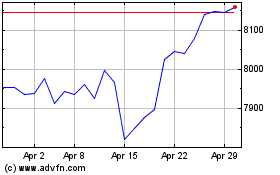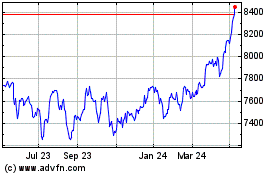Global Stocks Swoon as Investors Seek Havens
12 February 2016 - 1:56AM
Dow Jones News
By Riva Gold and Saumya Vaishampayan
Investors around the world fled stocks and piled into havens
Thursday as a cautious tone from the Federal Reserve, a resumption
of the slide in bank shares and a fresh fall in oil prices fueled
anxiety about the global economy.
As investors sought safety, U.S. government bonds, the yen and
gold surged. The yield on the 10-year Treasury note dropped to
1.588% from 1.706% on Wednesday, approaching its record closing low
of 1.404% in July 2012. Gold futures gained 3.6% to $1237.90 an
ounce, and the dollar fell 0.7% against the yen to Yen112.60.
Stock futures pointed to a 1.6% opening loss for the S&P
500. Changes in futures don't necessarily reflect market moves
after the opening bell.
U.S. crude oil declined 2.2% to $26.84.
The Stoxx Europe 600 fell 2.9%. Banking and mining shares
dropped, while the U.K.'s FTSE 100 index was on track for its
lowest close since 2012. Investors also shed stocks in Asia.
Stock-futures trading volumes were high but haven't yet surged
to levels hit last summer. "We just haven't seen the panic...'get
me out at any price' trading," said John Brady, managing director
at futures brokerage RJ O'Brien. "That says to us that we have
further to go."
Investors were nervous after Federal Reserve Chairwoman Janet
Yellen on Wednesday highlighted risks to growth and inflation, but
delivered a less dovish tone on interest rates than many investors
had hoped for. Ultralow interest rates boosted asset prices for
several years.
While Ms. Yellen's statements heightened anxiety about the state
of the U.S. economy, they "do not appear to take all of 2016 off
the table [for rate rises]," said Bill Northey, chief investment
officer at the Private Client Group at U.S. Bank.
Ms. Yellen will discuss the economic outlook and monetary policy
with the Senate Banking Committee later Thursday.
In Europe, bank stocks declined 5.7% following a brief bout of
relief on Wednesday.
French bank Société Générale SA on Thursday reported a jump in
net profit, but warned that it may fall short of its profitability
target this year. Shares fell 12%.
Shares in Credit Suisse fell 8.1%, while shares of UniCredit
fell 8.4% and Greece's Eurobank Ergasias fell 19%.
Europe's banking sector is down 28% this year amid uncertainty
around interest rates, non-performing loans and turmoil in emerging
markets.
Investors are now questioning whether the concerns will morph
into a systemic banking crisis, said Bo Christensen, chief analyst
at Danske Invest, which manages about $116 billion in assets. While
he doesn't believe they will, "it's just a lot of bad news coming
at a point in time when markets are very skittish," he said.
Low interest rates are also adding to pressure on banks as they
hit net interest margins. On Thursday, Sweden's central bank cut
its main interest rate further into negative territory, as the
European and Japanese central banks test the boundaries of how low
interest rates can go.
Meanwhile, falling oil prices have also hit energy companies and
high yield debt. Recent falls in oil prices have fueled concerns
among investors about the strength of the global economy, as well
as possible spillover effects from bankruptcies in the energy
sector and declines in energy-dependent economies.
"We're stuck in a nexus where the feedback loop from lower
commodity prices is negative to all equities and banks," said Mr.
Christensen.
Markets in the eurozone's periphery tumbled to multiyear lows
Thursday amid the broad flight from risky assets. Spanish and
Italian stock markets were on track to close at their lowest levels
since August 2013, while Portuguese stocks fell to their lowest
level since 2012's sovereign debt crisis and Greek stocks fell to
their lowest since 1989.
Portugal's 10-year yield surged by 0.65 percentage point to
4.13% as investors dumped government bonds perceived as risky.
Europe's basic-resources sector also fell sharply Thursday after
mining giant Rio Tinto PLC swung to an annual loss and scrapped its
commitment to maintaining or steadily increasing its dividend each
year amid a sharp downturn in commodity prices. The miner's shares
declined 5%.
Earlier, Hong Kong's Hang Seng Index fell 3.9%, catching up with
the week's selloff as the market reopened from a holiday.
Japan's Nikkei Stock Average and China's Shanghai Composite
Index were both closed, but investors continued to pile into the
yen, which tends to rise in times of market stress. Sharp gains in
the yen are fueling speculation that Japanese authorities could
intervene directly to dampen volatility.
In other currencies, the euro was up 0.4% against the dollar at
$1.1333, near its highest since October.
Write to Riva Gold at riva.gold@wsj.com
(END) Dow Jones Newswires
February 11, 2016 09:41 ET (14:41 GMT)
Copyright (c) 2016 Dow Jones & Company, Inc.
FTSE 100
Index Chart
From Mar 2024 to Apr 2024

FTSE 100
Index Chart
From Apr 2023 to Apr 2024
